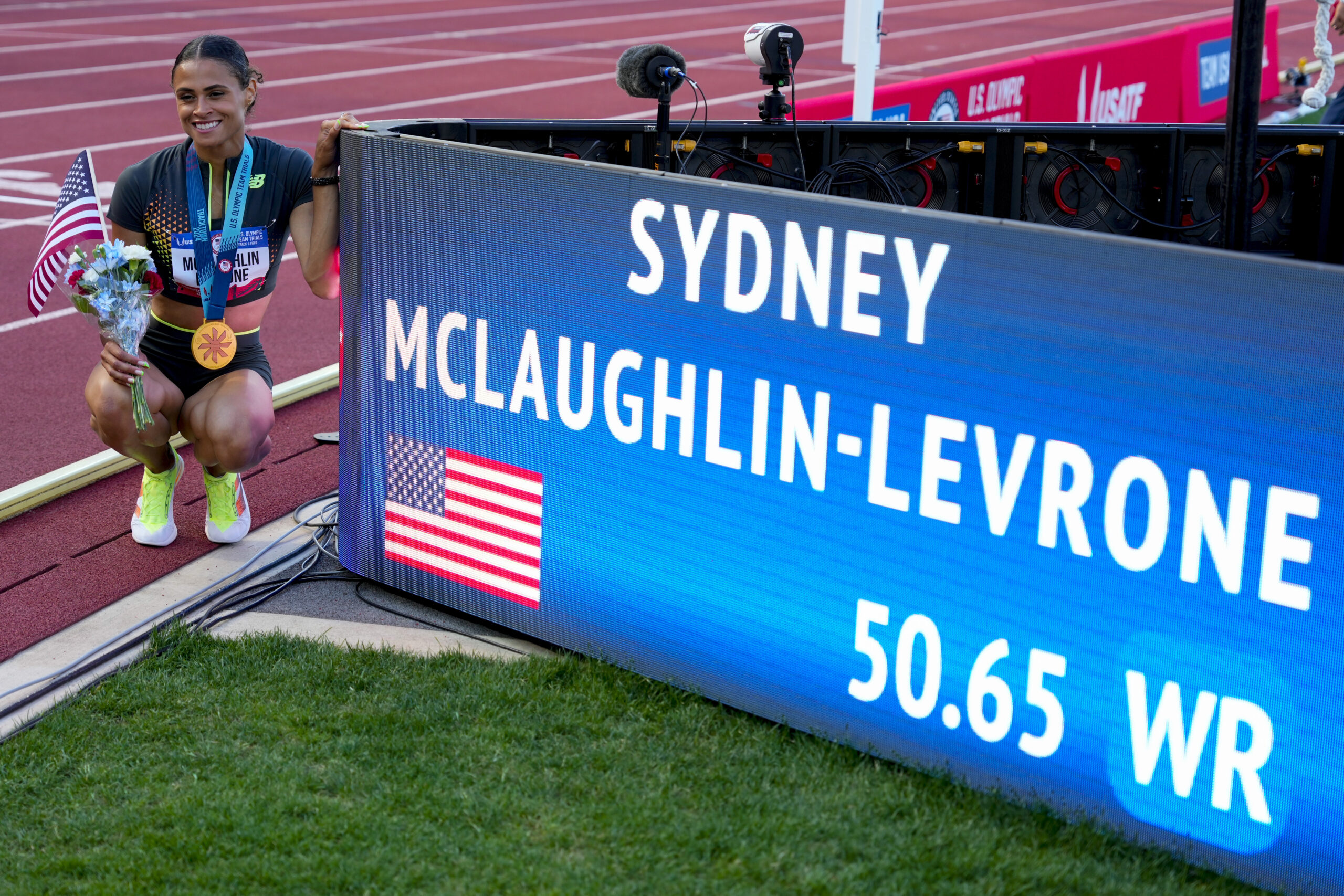Sydney McLaughlin-Levrone poses for a photo after winning the women’s 400-meter hurdles final during the U.S. Track and Field Olympic Team Trials, Sunday, June 30, 2024, in Eugene, Ore. (AP Photo/Charlie Neibergall)
EUGENE, Oregon — For the better part of two years, Sydney McLaughlin-Levrone all but disappeared from the 400-meter hurdles course.
Turns out, she wasn’t hiding or looking for something else to do. Just getting better at what she does best.
The 24-year-old Olympic champion lowered the world record for the fifth time Sunday, closing out U.S. Olympic trials with 10 leaps over the barriers, then an all-out sprint toward the finish line in 50.65 seconds. She broke her last record by .03 seconds.
READ: Sydney McLaughlin dominates 400m, breaks world record
50.65! A NEW WORLD RECORD FOR SYDNEY MCLAUGHLIN-LEVRONE #TrackFieldTrials24 pic.twitter.com/j57bj8qIgY
— NBC Sports (@NBCSports) July 1, 2024
This one came on the last day of trials at Hayward Field. Her first record came back in 2021 — also on the last day of trials and also at Hayward Field.
In fact, this marked the fourth of her five world records she’s set on the track at the University of Oregon, which has hosted the lion’s share of American track’s greatest moments over the past quarter century.
To say she expected this, though, would not be the case.
“Just shock. Honestly shock,” said McLaughlin-Levrone, who covered her mouth in amazement when she crossed and saw the time. “I know when it first came up it said, ‘50.67.’ I was like, ‘There’s just no way.’”
Then, the clock adjusted down two ticks.
“I wasn’t expecting that time,” she said.
READ: Sydney McLaughlin breaks own 400m hurdles record
Counting the two preliminary rounds at trials this week, this was only McLaughlin-Levrone’s fourth 400-meter hurdles race of the season. Unlike other times when she’s taken the track, there wasn’t a huge amount of buzz about her mark of 50.68 — set at world championships in 2022, also here at Hayward — going down this time.
A closer look shows this was all simply part of the plan.
She spent her time working on the shorter hurdles, along with 200- and 400-meter sprints, both of which she had hinted might be in her future as her main event. Really, what all those races were doing were making her better at her main job. All of them are good for speed. The short hurdles helped her master the difficult art of jumping off either foot.
“She ran in Atlanta, and she was having problems attacking the hurdles and getting her steps together” because of all her newfound speed, hurdling great Edwin Moses said of McLaughlin-Levrone’s first 400-hurdles race of 2024. “I told her I’d had similar problems and that her brain just had to catch up with her physicality.”
It did, and in an event that used to be decided by steps or slivers, McLaughlin-Levrone’s victory came by 1.99 seconds over Anna Cockrell and 2.12 over Jasmine Jones.
“She’s really fast and she’s really strong, it’s hard to put it any other way,” Cockrell said.
The latest record doesn’t so much reset the storyline for the Olympics — McLaughlin-Levrone would’ve been the big-time favorite either way — as it forces track to once again rethink what’s possible.
Now, instead of a much-anticipated showdown with Femke Bol of the Netherlands, the conversation will turn to when the 50-second mark might come tumbling down in this race. Maybe as soon as Aug. 8, which is the date of the Olympic final in Paris.
“It could happen,” Moses said. “She might need a couple more races, but that’s about it.”
It’s been a remarkable journey that has happened remarkably fast.
From 2003-19, the world record in this event stayed stuck at 52.34. American Dalilah Muhammad broke it twice in 2019 — the second time at world championships in a race that demoralized McLaughlin-Levrone and sparked her move over to coach Bobby Kersee.
Kersee changed everything for her. One of the biggest adjustments was dropping her to 14 strides between the early hurdles. It was a game-changer that has put her in a class by herself but also forced her to rework her takeoffs, which is where the work on the short hurdles has helped.
“I’ve said it before, (she) just ran a world record and it’s like we’re not even shocked at this point,” said Muhammad, the 2016 Olympic champion who finished sixth Sunday. “She’s just an amazing talent, a generational talent for sure. I didn’t know I’m the only one to beat her, so kudos to me.”
In addition to leaving trials with the world record in hurdles, she’s also the world leader this year in the flat 400.
McLaughlin-Levrone ran 48.75 in New York at the start of June — just more speed work, but also a daunting sign for any country that hopes to challenge the U.S. in the 4×400 relay come Paris.
McLaughlin-Levrone started running all those 400s and 200s shortly after the close of world championships in 2022 in Eugene, the time she lowered the world record to 50.68.
At the time, she hinted that all those races might be the future for her. Not until a few weeks ago did she say she was going back to her first love.
Then, on a calm night in Oregon, she pulled down the curtain on the 2024 Olympic trials, and threw a little jolt into track at the same time: All those other races weren’t just for kicks.
“The 400 hurdles is a mixture of all of it,” she said. “It’s the short hurdles combined with the 4, combined with the 2. You need that endurance, that speed and that technicality. So those were definitely just building blocks along the way to get us through.”
